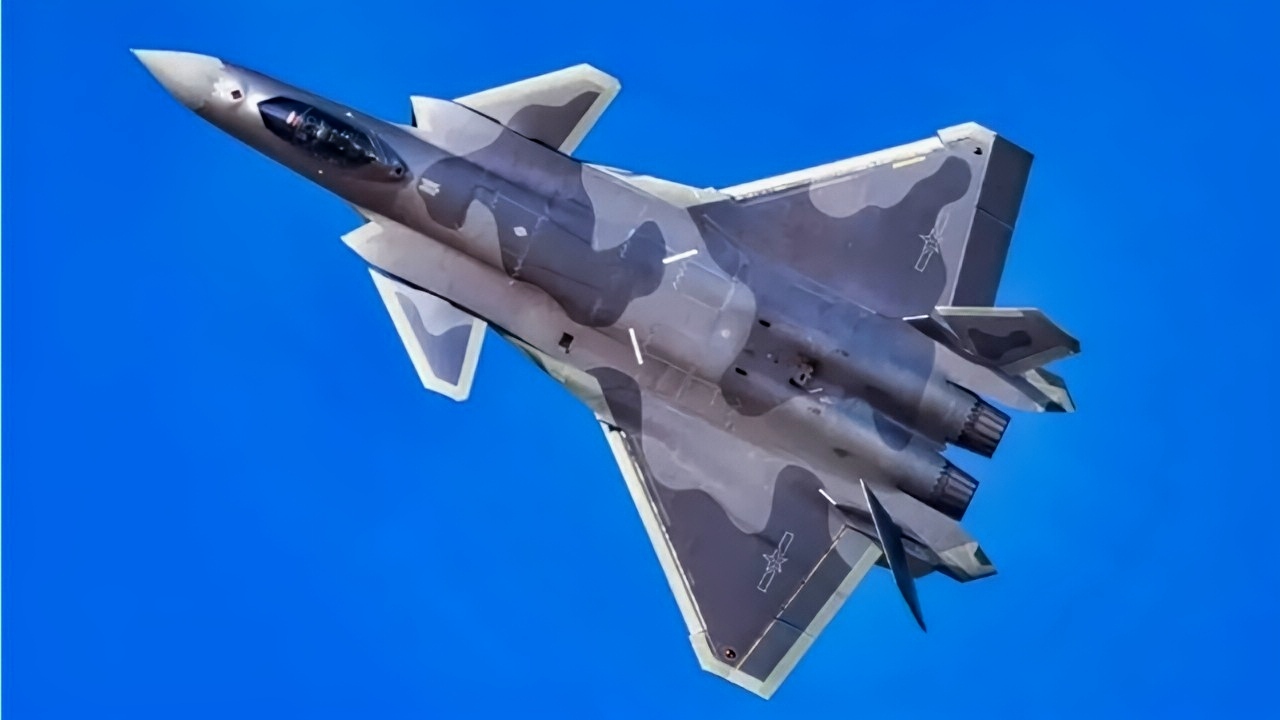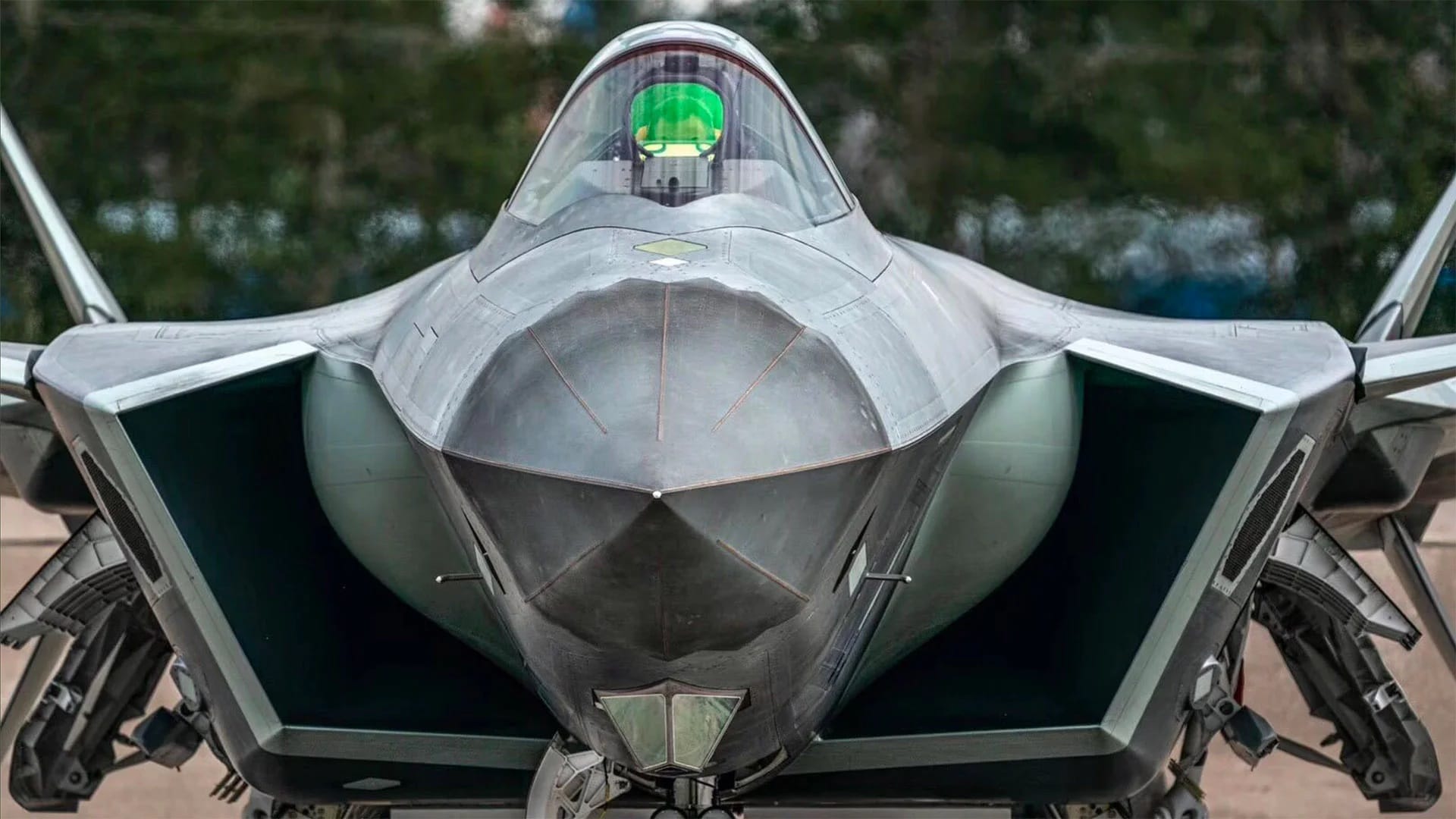Key Points and Summary – China’s J-20 isn’t just a sleek Mach-2 stealth jet—it can also go “beast mode.” New photos suggest loadouts of up to eight external air-to-air missiles, hinting at a bomb-truck role to threaten tankers, ISR aircraft, and fighters from long range—potentially with PL-15s.
-The trade-off is obvious: pylons and heavy stores erode stealth and speed, making the jet easier to spot and slower to sprint.
-That’s why the missile duel matters. As the U.S. moves to the AIM-260, range and guidance could decide who fires first—and lives to fire again—when the J-20 chooses volume over invisibility.
The J-20 Fighter Can Go Beast Mode
The Chinese J-20 is well known for its Mach 2.0 speed and 5th-generation stealth configuration; yet, beneath the surface of these more visible or widely discussed performance parameters, the People’s Liberation Army Air Force (PLAAF) J-20 also operates with a lesser-known, unique “bomb-truck” type of capability.
Available specifications on the J-20 indicate that the aircraft can take off with 27,988 pounds of internal and external ordnance, an amount significantly larger than that of a fully loaded F-35, which can fly with 18,000 pounds of weapons.
Arming the airframe with maximum weapons and bomb-carrying capacity, often referred to as “beast mode,” enables an aircraft to deliver a significantly larger volume of weapons on a single mission, which reduces risk to other airplanes, minimizes refueling, and potentially extends dwell time over targets.
J-20 Beast Mode
Newly emerging photos appearing on X, showing the aircraft fully armed with as many as eight air-to-air missiles beneath the wings, thrust the question of ‘beast mode’ on the J-20 into the spotlight.
Speculative observations made by a Chinese military expert researcher regarding the J-20 posting raised the question of whether the missiles were beyond visual range, PLAAF PL-15 air-to-air missiles.
The Aviationist cited photo credit for the fully armed J-20 as “Via Weibo via Andreas Rupprecht on X.”
Whether the missiles in the photograph were PL-15s is unconfirmed; however, the question was posed in the X posting by Rupprecht.
PLAAF PL-15
The Chinese PL-15 Thunderbolt, as it is referred to, is reported to be capable of traveling 200km to hit targets, a range that may or may not compete with the classified range of the US Air Force’s AIM-120D.
Software upgrades, such as the fleet-wide 3.2b upgrade for the F-22, have increased the range, guidance, and durability of the AIM-120D.
Nevertheless, the ability to fly with as many as eight air-to-air missiles on external pylons or hardpoints suggests that the J-20 can operate with substantial air-to-air long-range firepower.
This is the kind of weapon that could be used to destroy tankers, surveillance planes, transport aircraft, helicopters, or even fighter jets from stand-off ranges.
The Aviationist makes an interesting point that the PLAAF’s Concept of Operations may be to leverage the J-20’s stealth capabilities to maneuver into long-range strike positions against otherwise unreachable US and allied aircraft.

China J-20 Mighty Dragon in 2021. Image Credit: Chinese Internet.
In the event that sensing, targeting, and radar ranges between the J-20, F-35, and F-22 were comparable, the range and precision of an air-to-air missile would be a defining factor in which aircraft prevailed in an air-to-air conflict.
This may be why the US Air Force is fast-tracking the high-speed, long-range AIM-120 air-to-air weapon.
This now-in-development weapon is slated to replace the existing AIM-120D as an air-to-air missile, so it’s conceivable that the AIM-260 is being fast-tracked to equal or out-range the PLAAF PL-15.
Stealth & Speed for J-20
However, it is naturally self-evident that a fully loaded J-20 with weapons on external hard points would not operate with speed and stealth.
The J-20’s speed would be compromised by the sheer weight of the weaponry, and external weapons would, of course, offer ground-based radar more contours, shapes, and edges off of which to bounce an electromagnetic signature.
This means a fully-loaded “bomb-truck” type of J-20 would likely be challenged to remain undetected at ranges from which it might seek to attack.
About the Author: Kris Osborn, Warrior Maven President
Kris Osborn is the President of Warrior Maven – Center for Military Modernization. Osborn previously served at the Pentagon as a highly qualified expert in the Office of the Assistant Secretary of the Army—Acquisition, Logistics & Technology. Osborn has also worked as an anchor and on-air military specialist at national TV networks. He has appeared as a guest military expert on Fox News, MSNBC, The Military Channel, and The History Channel. He also has a Masters Degree in Comparative Literature from Columbia University.
More Military
Su-57 Felon vs. Eurofighter Typhoon: Who Wins?
The P-8A Poseidon Might Be the Ultimate Submarine Hunter
The S-3 Viking: The Best Submarine Killer Retired?










